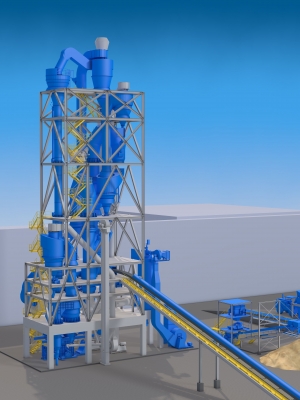


(Posted on 31/03/20)
thyssenkrupp is to fit the first cement plant with a system for the production of calcined clay
for the Dutch-based company Cimpor Global Holdings. The technology developed by
thyssenkrupp lowers CO2 emissions in cement production by up to 40 percent. It involves
replacing part of the cement clinker with calcined, i.e. thermally activated, clay. Cimpor
Global Holdings will use the technology, known as “polysius activated clay”, on an
industrial scale at a new plant being built near the Cameroon sea port of Kribi. On
completion in fall 2021, the plant will save more than 120,000 tons of CO2 emissions every
An important building material, cement is produced by an energy-intensive process in
which large quantities of carbon dioxide are emitted. “At thyssenkrupp we are convinced
that CO2-neutral cement production is fundamentally possible and can be achieved in
several steps,” says Pablo Hofelich, CEO of the Cement Technologies business unit. “We
are already very advanced in many areas on the technology side. We offer our customers
products that reduce environmental impact and at the same time reduce costs, making it
possible for example to significantly cut CO2 and nitrogen oxide emissions and reduce the
use of raw materials, water, or fossil fuels such as coal and gas.”
Under the order, thyssenkrupp is carrying out engineering, procurement, construction and
commissioning of the new plant, which will produce 720 tons of activated clay per day. It is
the second calcined clay project of Cimpor Global Holdings.
CO2 is a natural constituent of limestone, the main component of cement. For each ton of
cement clinker produced, around 790 kilograms of process-related CO2 is emitted. Around
two thirds of this results from the limestone used, which releases CO2 in a chemical reaction
in the production process. At the same time the process requires large amounts of energy,
because for the production of cement clinker, limestone has to be heated with other
aggregates to temperatures of more than 1,400 degrees Celsius.
With polysius activated clay, thyssenkrupp has developed a technology that allows around
one third of the cement clinker to be replaced with activated clay. The clay is heated to
around 800 degrees Celsius – significantly less heat than is needed to produce clinker.
Thanks to the significant energy saving in the production of thermally activated clays and
the changed chemical composition, CO2 emissions per ton of cement can be cut by up to 40
The National Grain and Feed Association (NGFA) has applauded Senator Deb. Fischer’s (R-Neb.) reintroduction... Read more
Anglo American plc and Teck Resources Limited have received regulatory approval from the Government... Read more
The Rhodes Ridge Joint Venture has approved a $191 million (A$294 million) (Rio Tinto share $96 million... Read more
Trafigura Group Pte Ltd, a global leader in the commodities industry, has announced its financial results... Read more
Rio Tinto has successfully produced the first copper from the Johnson Camp mine in Arizona using its... Read more
The American Soybean Association’s World Initiative for Soy in Human Health programme and the... Read more
Karlka Nyiyaparli Aboriginal Corporation (KNAC) Registered Native Title Body Corporate and Rio Tinto... Read more
OCI Global, a leading global producer and distributor of nitrogen products has announced that it has... Read more
In December 2024, SSAB was granted a permit by the Land and Environment Court at Umeå District... Read more
The President of the Republic of Guinea has joined project partners WCS1, Baowu, Chinalco and Rio Tinto... Read more